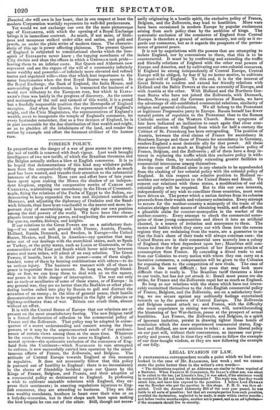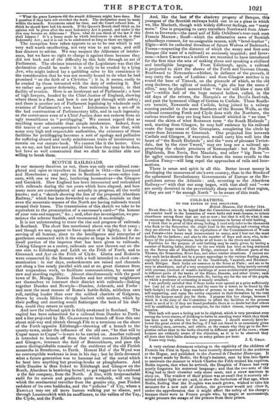LEGAL EVASION OF LAW.
A PROFESSIONAL correspondent recalls a point which we had over- looked in the case of Mr. SALOMONS, last week ; and we cannot state the point better than in the writer's own words-
" The declarations required of an Alderman are similar to those required of a Barrister. When FRANCIS H. GOLDSMID, Sir Isaac's eldest SOD, WAS about to be called to the bar, [at Lincoln's inn,] it was asked, if his admission would be resisted if he did not make the declaration ? The reply was, that they would admit him, and leave him exposed to the penalties. I believe Lord DENMAN was the Bencher who put the question in this shape. F. H. G. was then ad- mitted. Until the Annual Indemnity Bill of the next year passed, he was liable to all sorts of penalties: but that act exempts parties from such penalties, provided the declaration, neglected to be made, is made within twelve months ; and before twelve months expire, another act is passed, and soon ad infinitum— if the recusants should live to eternity.
"What the grave Lawyers did the stupid Aldermen might have done. But I question if they have not overshot the mark. The declaration must be made within the month. SALOMONS asked for time, and the Court refused him. I think he should have had his month. If the Queen's Bench shall think so, its opinion will be given after the next Indemnity Act is passed, and under it the Jew may become an Alderman There, what do you think of the law if this shall happen ? It 's a funny mode by which intolerance is checked, is that indemnity Act ; and it is not to be condemned as long as there are bigots."
The exception here taken appears to us to be one which is not very well worth recollecting, not very wise to act upon, and still less discreet to advise. We may suspect the Aldermen of intoler- ance, but we have no right to charge it against them because they did not back out of the difficulty by this hole through an act of Parliament. The obvious intention of the Legislature was that the declaration should be made : it is easily to be evaded by a lying Jew, who might indeed lay a quibbling salve to his conscience in the consideration that he was not morally bound to do what he had promised " on the faith of a Christian" ; it is, it seems, easily to be evaded by those intrusted with the duty of enforcing it. But we rather see greater deformity, than redeeming beauty, in that facility of evasion. Here is an intolerant act of Parliament ; a host of high lawyers, headed by the Chief Justice of England, showing where there is a flaw, and how it can be got through with safety ; and there is another act of Parliament legalizing by wholesale such evasions of Parliament's own laws ! Intolerance has a set-off in the bad construction of Parliamentary bills, and in such ingenuity as the connivance even of a Chief Justice does not redeem from an ugly resemblance to " pettifogging." We cannot regard that as anything more admirable than simple intolerance. Indeed, from the tenour of our correspondent's remarks, it is clear that, with some very high and respectable authorities, the existence of these facilities for pettifogging becomes a sort of apology and palliative for suffering absurd and really mischievous traits of intolerance to remain on our statute-book. We cannot like it the better. Give us, we say, not bad laws and judicial hints how they may be broken, but laws so well constructed that we shall be neither able nor willing to break them.



























 Previous page
Previous page